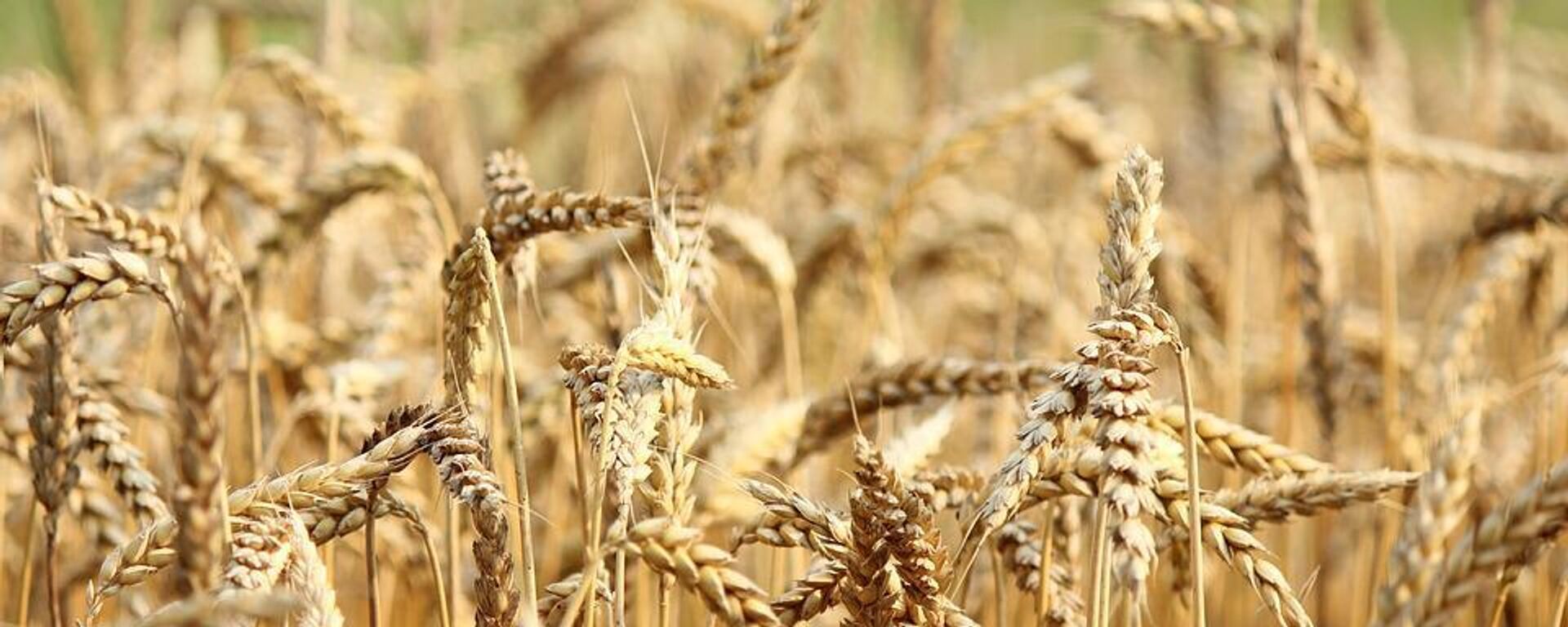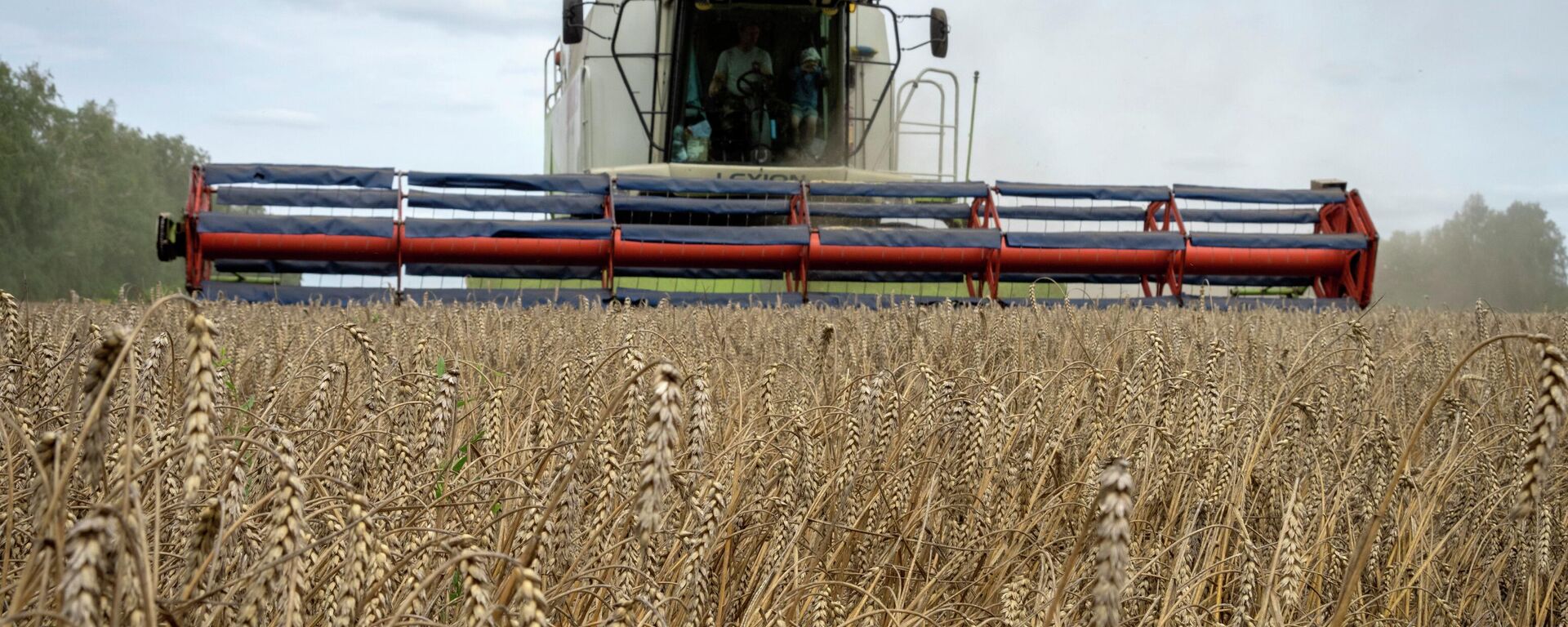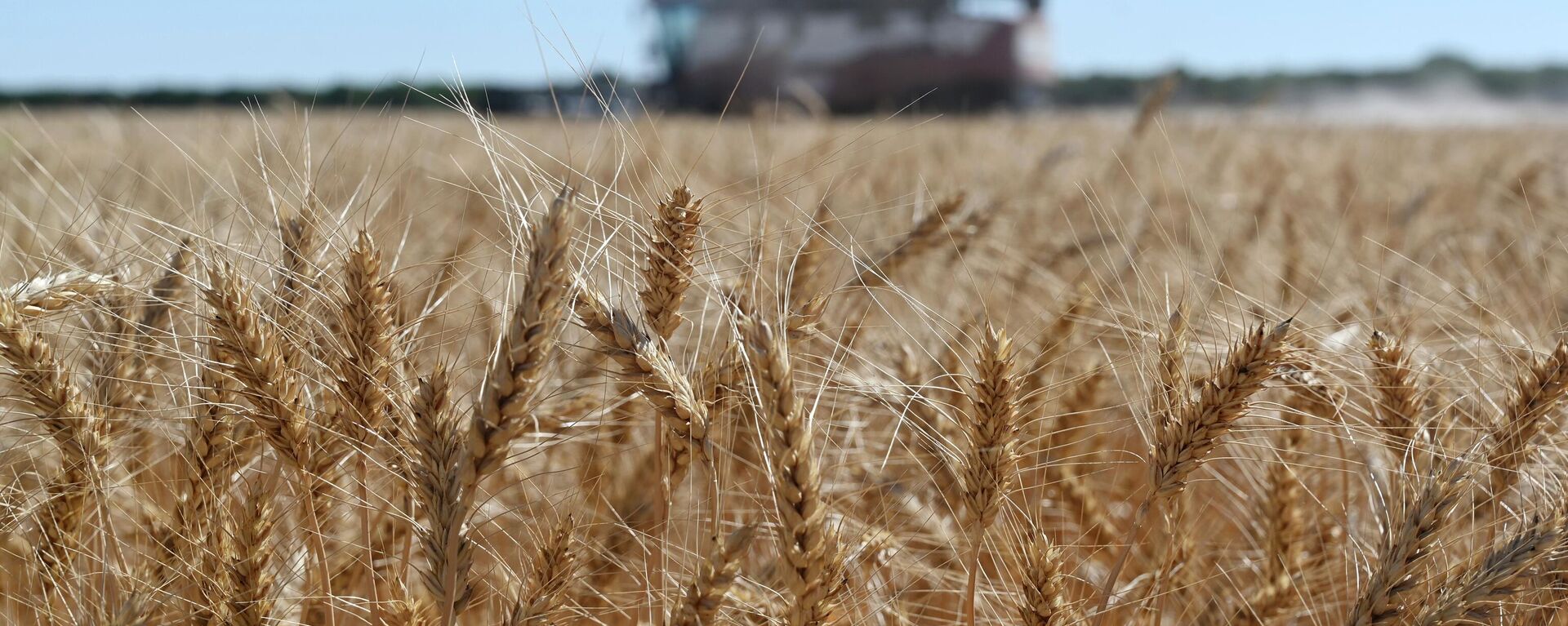https://sputnikglobe.com/20230419/food-bans-and-possible-grain-deal-suspension-to-curb-ukraines-profits-1109662415.html
Food Bans and Possible Grain Deal Suspension to Curb Ukraine's Profits
Food Bans and Possible Grain Deal Suspension to Curb Ukraine's Profits
Sputnik International
Kiev's representatives in Istanbul are sabotaging the grain deal, leading to the share of poorer countries receiving Ukrainian food to be reduced to a minimum, according to the Russian Foreign Ministry.
2023-04-19T14:48+0000
2023-04-19T14:48+0000
2023-04-19T14:48+0000
analysis
opinion
russia
ukraine
grain
food
food shortages
food crisis
south africa
central africa
https://cdn1.img.sputnikglobe.com/img/102665/69/1026656984_0:161:3071:1888_1920x0_80_0_0_393e8d9c80ed43d853fb6f11a8e34a9f.jpg
Russia is facing a plethora of hurdles to implement the Black Sea Grain Initiative, according to Anatoly Tikhonov, head of Russia's Center for International Agribusiness and Food Security.Ukraine & West Don't Comply With Food Security GoalsThe Joint Coordination Centre (JCC) in Istanbul is experiencing difficulties registering new vessels and conducting inspections as a result of actions by Ukrainian representatives as well as UN officials who appear to be unwilling or unable to stand up to them, Russian Foreign Ministry spokeswoman Maria Zakharova revealed on Wednesday.The Black Sea grain initiative was concluded between Moscow, Kiev, Ankara and the UN amid the conflict in Ukraine in July 2022. The agreement provides for the exports of Ukrainian grain, food and fertilizers over the Black Sea from three ports, including Odessa. The package agreement also includes a memorandum of understanding between Moscow and the UN to unblock Russian grain and fertilizer exports via the Black Sea.The agreement was struck to primarily deliver agricultural products to the countries of the Global South which are facing a food crisis. However, as it turned out, those in need received a minuscule part of Ukrainian food exports, while Europe got the lion's share of Ukrainian products.Around 45% of Ukrainian grain has gone to European countries and only 3% to Africa, Russian President Vladimir Putin revealed during the Second International Parliamentary Conference "Russia – Africa" held on March 20.Russia signaled on March 18 that it would extend the grain deal only for 60 days because of the lack of progress in the issue of the supply of Russian food and fertilizers to the world's market in accordance with the initiatives. Moscow noted that Russian shipping companies and banks continue to face sanctions and barriers slapped on them by Washington, Brussels and London on almost all sectors of Russia's economy and hindering the country's food trade and transportation.Commenting on the latest instances of bribery and sabotage by Kiev representatives and the West's unwillingness to follow the provisions of the deal, Zakharova noted that "the Ukrainians and Westerners no longer trouble themselves with either analyzing compliance with the Black Sea Initiative (not to mention the failure to act upon the Russia-UN memorandum), or making any attempts to comply with their own high-flown statements about global food security."Dissenting CEE Countries Ban Ukraine FoodMeanwhile, Central and Eastern European (CEE) countries have raised alarm over Brussels' "EU-Ukraine Solidarity Lanes" which led to the accumulation of surplus grain in the bloc. Eventually, this policy backfired on their domestic producers: Hungarian grain producers lost between 23% and 37% of their income over the past year as food imports from Ukraine jumped from 40,000 - 60,000 tons to 2.5 million tonsBulgaria, Hungary, Poland, Romania and Slovakia have repeatedly called on Brussels to transfer all surplus grain out of their states to Africa and the Middle East as was initially agreed under the "EU-Ukraine Solidarity Lanes" initiative."The structure of agriculture is represented by producers of agricultural products, buyers of agricultural products and processors. It is profitable for processors to take cheap raw materials, and their products become more competitive. Against the backdrop of unprecedented inflation and the fact that the population has begun to reduce food consumption, so that economic processes do not stop, processors and meat producers need cheap grain, cheap animal feed. Meanwhile, their national product remains unclaimed, uncompetitive if it is more expensive," Tikhonov continued."In general, the countries of Europe maintain different attitudes towards the demarche of Poland, Hungary, Slovakia and Romania," said Tikhonov. "Therefore, now we can only observe how the situation will develop; whether the European Commission will be able to quickly 'extinguish the fire' and how exactly, because the EU does not have its own farmers, this is a bureaucratic structure." Will Russia Extend Grain Deal in May?Meanwhile, it remains unclear whether Russia will extend the grain deal after May 18, according to Tikhonov.The Russian Foreign Ministry made it clear on April 19 that the West, in fact, "trampled upon the original humanitarian goals of the Istanbul package agreements and showed complete disregard for the countries’ needs for grain and fertilizers." What really happened is that "the Europeans threw all their weight into satisfying Kiev’s growing commercial appetites and fulfilling their goals of filling their warehouses with cheap Ukrainian grain," Zakharova emphasized in a Wednesday statement.The Kiev regime is obviously benefitting from the current situation, according to the expert. Moreover, in addition to economic issues pursued by the Ukrainian leadership, there are also military-political ones.While maintaining the grain deal and the export of grain from the three main Black Sea ports, Ukraine receives a security guarantee in relation to the Black Sea ports from Russia. The initiative is consuming Russia's military resources apart from providing the Kiev regime with much needed profits. "All of this plays into the hands of Ukrainian Nazism and supports their economy," concluded Tikhonov.
https://sputnikglobe.com/20230402/influx-of-ukraines-cheap-grain-to-europe-fuels-anger-erodes-support-for-kiev-regime-1109048118.html
https://sputnikglobe.com/20230418/eu-dissenters-ban-ukraines-food-as-blocs-unity-crumbles-1109616681.html
https://sputnikglobe.com/20230417/unilateral-actions-unacceptable-eu-slams-poland-hungary-for-ban-on-ukraine-grain-imports-1109584200.html
russia
ukraine
south africa
central africa
sub-saharan africa
black sea
poland
hungary
romania
slovakia
Sputnik International
feedback@sputniknews.com
+74956456601
MIA „Rossiya Segodnya“
2023
News
en_EN
Sputnik International
feedback@sputniknews.com
+74956456601
MIA „Rossiya Segodnya“
Sputnik International
feedback@sputniknews.com
+74956456601
MIA „Rossiya Segodnya“
black sea grain initiative, russia-ukraine grain deal, russian grain, russian fertilizers, ukrainian grain pesticides, global south food crisis, europe consuming ukrainian grain, west and kiev don't comply with grain deal, european food ban ukraine, ukraine grain banned europe, grain glut in europe
black sea grain initiative, russia-ukraine grain deal, russian grain, russian fertilizers, ukrainian grain pesticides, global south food crisis, europe consuming ukrainian grain, west and kiev don't comply with grain deal, european food ban ukraine, ukraine grain banned europe, grain glut in europe
Food Bans and Possible Grain Deal Suspension to Curb Ukraine's Profits
Kiev's representatives in Istanbul are sabotaging the grain deal, leading to the share of poorer countries receiving Ukrainian food to be reduced to a minimum, according to the Russian Foreign Ministry. Meanwhile, Eastern and Central European states have banned Ukrainian food imports to shield domestic producers.
Russia is facing a plethora of hurdles to implement the Black Sea Grain Initiative, according to Anatoly Tikhonov, head of Russia's Center for International Agribusiness and Food Security.
"First, there is a ban on mineral fertilizers, official and unofficial," Tikhonov told Sputnik. "Second, there are problems with settlements, it was clearly requested that the Russian Agricultural Bank, which provides payments, should be connected to SWIFT. This had not been done. Third, our ships cannot enter ports and use the port culture of European countries. Fourth, there is a problem with freight. In fact, charterers have not received a strict ban on the transportation of agricultural products, but, nevertheless, it is impossible to charter ships, because all ship owners are afraid of falling under secondary sanctions because there have been no clear signals from the European Commission and the United States. If a ship can be found, it is impossible to charter, insure, and even more so pay for it. Our achievements in grain exports in recent years are the colossal efforts of our exporters, agricultural producers, who manage to export a huge amount of grain."
Ukraine & West Don't Comply With Food Security Goals
The Joint Coordination Centre (JCC) in Istanbul is experiencing difficulties registering new vessels and conducting inspections as a result of actions by Ukrainian representatives as well as UN officials who appear to be unwilling or unable to stand up to them, Russian Foreign Ministry spokeswoman Maria Zakharova revealed on Wednesday.
"As a result of these actions, the share of recipients of Ukrainian food in poor countries has fallen to the lowest level (out of 28.3 million tons of exported grain, those countries received only 742,000, or 2.6%). The owners of incoming ships who refused to pay a bribe are forced to wait for registration for many months," Zakharova said in an official statement on April 19, adding that "the process for obtaining applications for registration under the Black Sea Initiative is in the hands of the Ukrainians, while the UN is in charge of the inspection plans."
The Black Sea grain initiative was concluded between Moscow, Kiev, Ankara and the UN amid the conflict in Ukraine in July 2022. The agreement provides for the exports of Ukrainian grain, food and fertilizers over the Black Sea from three ports, including Odessa. The package agreement also includes a memorandum of understanding between Moscow and the UN to unblock Russian grain and fertilizer exports via the Black Sea.
The agreement was struck to primarily deliver agricultural products to the countries of the Global South which are facing a food crisis. However, as it turned out, those in need received a minuscule part of Ukrainian food exports, while Europe got the lion's share of Ukrainian products.
Around 45% of Ukrainian grain has gone to European countries and only 3% to Africa, Russian President Vladimir Putin revealed during the Second International Parliamentary Conference "Russia – Africa" held on March 20.
Russia signaled on March 18 that it would extend the grain deal only for 60 days because of the lack of progress in the issue of the supply of Russian food and fertilizers to the world's market in accordance with the initiatives. Moscow noted that Russian shipping companies and banks continue to face sanctions and barriers slapped on them by Washington, Brussels and London on almost all sectors of Russia's economy and hindering the country's food trade and transportation.
Commenting on the latest instances of bribery and sabotage by Kiev representatives and the West's unwillingness to follow the provisions of the deal, Zakharova noted that "the Ukrainians and Westerners no longer trouble themselves with either analyzing compliance with the Black Sea Initiative (not to mention the failure to act upon the Russia-UN memorandum), or making any attempts to comply with their own high-flown statements about global food security."
Dissenting CEE Countries Ban Ukraine Food
Meanwhile, Central and Eastern European (CEE) countries have raised
alarm over Brussels' "EU-Ukraine Solidarity Lanes" which led to the accumulation of surplus grain in the bloc.
Eventually, this policy backfired on their domestic producers: Hungarian grain producers lost between 23% and 37% of their income over the past year as food imports from Ukraine jumped from 40,000 - 60,000 tons to 2.5 million tons
Bulgaria, Hungary, Poland, Romania and Slovakia have repeatedly called on Brussels to transfer all surplus grain out of their states to Africa and the Middle East as was initially agreed under the "EU-Ukraine Solidarity Lanes" initiative.
"It was assumed that the products would be taken to the ports and sent further," said Tikhonov. "But there is too much grain in Ukraine, colossal needs for replenishing its budget and there are limits on the shelf life of grain, while they are still exporting last year's grain. Grain began to be quickly sold on the territory of transit countries due to its cheapness. Before the Russian special military operation, the European Union had a grain supply quota of 1.5 million tons per year, and here it is 1.5 million tons per month.
"The structure of agriculture is represented by producers of agricultural products, buyers of agricultural products and processors. It is profitable for processors to take cheap raw materials, and their products become more competitive. Against the backdrop of unprecedented inflation and the fact that the population has begun to reduce food consumption, so that economic processes do not stop, processors and meat producers need cheap grain, cheap animal feed. Meanwhile, their national product remains unclaimed, uncompetitive if it is more expensive," Tikhonov continued.
Poland, Hungary, Slovakia and Bulgaria have so far introduced a temporary ban on Ukrainian grain imports and other agricultural products transiting through their countries. Bulgaria announced the restrictions on Wednesday even though previously, the EU rejected food bans imposed by Warsaw, Budapest and Bratislava. Earlier, on Tuesday, Romania signaled it was ready to follow suit.
"In general, the countries of Europe maintain different attitudes towards the demarche of Poland, Hungary, Slovakia and Romania," said Tikhonov. "Therefore, now we can only observe how the situation will develop; whether the European Commission will be able to quickly 'extinguish the fire' and how exactly, because the EU does not have its own farmers, this is a bureaucratic structure."
"I think that this situation can play into Russia's hands, because if transit through these countries is banned, and Ukrainian grain, cheap, low-quality, chemically impure, contaminated with pesticides, remains in Ukraine, then the demand for Russian grain may increase. And we [Russia] really need this now, because we also have an expectation of a new harvest, while about 30 million tons of grain from the last harvest remains in our warehouses. We have a colossal overstocking. And it is very important for us to sell it so that the money and the harvest do not disappear, but work for the economy - agricultural producers," he continued.
Will Russia Extend Grain Deal in May?
Meanwhile, it remains unclear whether Russia will extend the grain deal after May 18, according to Tikhonov.
"The trend is unfavorable for us now," the food security expert underscored. "That is, in fact, this deal only works for the economy of Ukraine. The extension of the deal until May 18 was a strong and unequivocal signal to our partners that if you do not solve the issues that we agreed on, then there will be no deal. As far as we can see now, despite the efforts of the UN, there is no progress on these issues."
The Russian Foreign Ministry made it clear on April 19 that the West, in fact, "trampled upon the original humanitarian goals of the Istanbul package agreements and showed complete disregard for the countries’ needs for grain and fertilizers." What really happened is that "the Europeans threw all their weight into satisfying Kiev’s growing commercial appetites and fulfilling their goals of filling their warehouses with cheap Ukrainian grain," Zakharova emphasized in a Wednesday statement.
"The presidential press secretary mentioned this, and the head of the Foreign Ministry said that the deal is in doubt, since it is simply not profitable for the Russian Federation in the current state of affairs," noted Tikhonov. "In essence, we ensure the transit of Ukrainian grain. At the same time, we understand that the largest national corporations stand behind Ukrainian grain. That is, we, it turns out, work for the economy of other countries. Sorry, but we have our own national interests."
The Kiev regime is obviously benefitting from the current situation, according to the expert. Moreover, in addition to economic issues pursued by the Ukrainian leadership, there are also military-political ones.
While maintaining the grain deal and the export of grain from the three main Black Sea ports, Ukraine receives a security guarantee in relation to the Black Sea ports from Russia. The initiative is consuming Russia's military resources apart from providing the Kiev regime with much needed profits. "All of this plays into the hands of Ukrainian Nazism and supports their economy," concluded Tikhonov.





